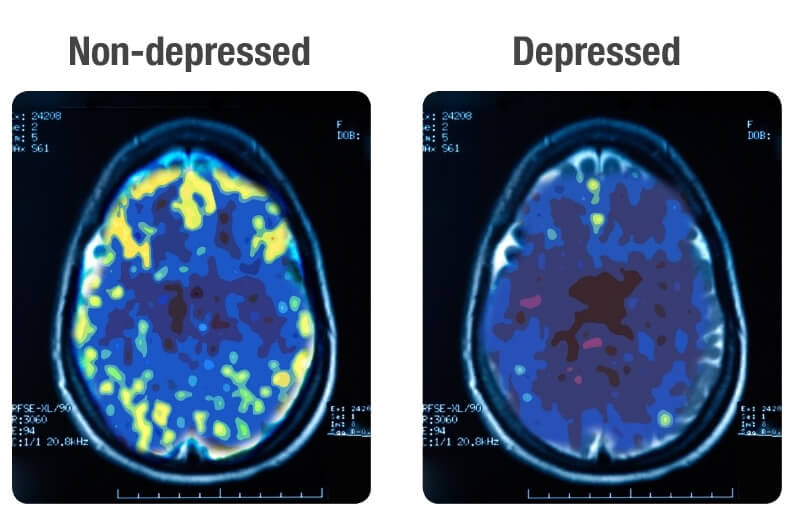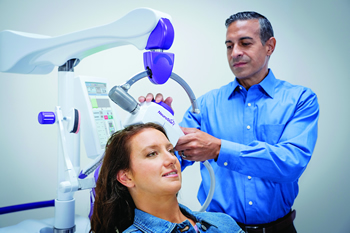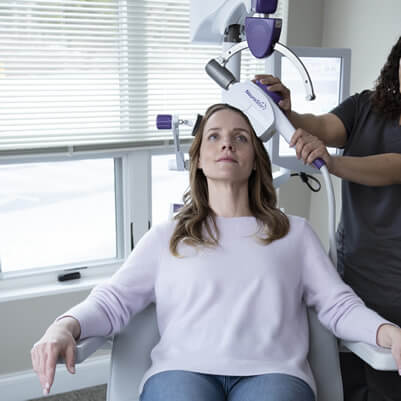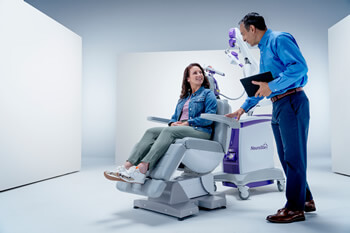What is NeuroStar Advanced Therapy (TMS)?
During a NeuroStar treatment session, a magnet similar in strength to that used in a magnetic resonance imaging (MRI) machine is used to stimulate nerve cells in the area of the brain thought to control mood. These magnetic pulses may have a positive effect on the brain's neurotransmitter levels, making long-term remission possible.
Take the first step
to overcoming your depression today.
Schedule a free consultation with our NeuroStar Coordinator to see if this treatment is right for you.

A PET Scan measures vital functions such as blood flow, oxygen use, and blood sugar (glucose) metabolism.
Source: Mark George, M.D. Biological Psychiatry Branch Division of Intramural Research Programs, NMH 1993
How NeuroStar® TMS Therapy works
Here's what you can expect from a NeuroStar Advanced Therapy (TMS) session:
NeuroStar ® Therapy Insurance Coverage
Since the FDA clearance of TMS in 2008, insurance coverage for eligible patients has increased significantly. Currently, there are over 60 coverage policies for TMS, including most Medicare contractors. Although TMS is not a first line of treatment, it is an alternative option for those who are not responding to or cannot tolerate medications. Call us today to speak directly with a NeuroStar Coordinator about your specific insurance plan, coverage, and eligibility. Click Here to contact us to see if your insurance company offers coverage for TMS treatments.
Professional Athlete Drew Robinson’s Journey with NeuroStar
Frequently Asked Questions
Transcranial magnetic stimulation, often referred to as TMS is a noninvasive procedure that uses magnetic fields to stimulate nerve cells in the brain to improve symptoms of depression. TMS is typically used when antidepressant medications haven't been effective, have ceased working, or as an alternative to medication.
TMS involves delivering magnetic pulses to specific parts of the brain.
A typical initial course of treatment is about 19-37 minutes daily over 4-6 weeks.
While there may be some minor discomfort at the treatment site (where the device touches your head), it generally subsides within the first week of treatment. There is no sedation, or impact on your alertness.
You can read, watch TV, or talk with your treatment coordinator during your session and drive home immediately after treatment.
A vast majority of commercial and Medicare plans have recognized the effectiveness of treating depression with TMS Therapy and now cover TMS as part of their plans.
TMS does not circulate in the blood throughout the body, so it does not have side effects like weight gain, sexual dysfunction, nausea, dry mouth, sedation, etc. The most common side effects reported during clinical trials were headache and scalp discomfort - generally mild to moderate - occurring less frequently after the first week of treatment.
No. TMS Therapy involves a unique method of using pulsed magnetic fields for a therapeutic benefit. The intensity of the magnetic field is similar to that of an MRI. These techniques differ radically from the popular use of low-intensity static magnetic fields. Those products deliver weak and undirected static fields that are not capable of activating brain cells. The activation and stimulation of brain cells is a key part of why TMS is so effective.
Clinical Trials and Academic Studies
Carpenter LL, et al. (2012). Transcranial Magnetic Stimulation (TMS) for Major Depression: A Multisite, Naturalistic, Observational Study of Acute Treatment Outcomes in Clinical Practice. Depression and Anxiety, 29(7):587-596. www.ncbi.nlm.nih.gov/pubmed/22689344
George MS, et al. (2010). Daily Left Prefrontal Transcranial Magnetic Stimulation Therapy for Major Depressive Disorder: A Sham-Controlled Randomized Trial. Arch Gen Psychiatry, 67(5):507-516. www.ncbi.nlm.nih.gov/pubmed/20439832
Dunner DL, et al. (2014). A Multisite, Naturalistic, Observational Study of Transcranial Magnetic Stimulation (TMS) for Patients with Pharmacoresistant Major Depressive Disorder: Durability of Benefit Over a 1-Year Follow-Up Period. J Clin Psychiatry. 75(12):1394-1401. www.ncbi.nlm.nih.gov/pubmed/25271871
O’Reardon JP, et al. (2007). Efficacy and Safety of Transcranial Magnetic Stimulation in the Acute Treatment of Major Depression: A Multisite Randomized Controlled Trial. Biol Psychiatry, 62(11):1208-1216. www.ncbi.nlm.nih.gov/pubmed/17573044
The NeuroStar Advanced Therapy System is indicated for the treatment of depressive episodes and for decreasing anxiety symptoms for those who may exhibit comorbid anxiety symptoms
in adult patients suffering from Major Depressive Disorder (MDD) and who failed to achieve satisfactory improvement from previous antidepressant medication treatment in the current episode.
The NeuroStar Advanced Therapy system is intended to be used as an adjunct for the treatment of adult patients suffering from Obsessive-Compulsive Disorder (OCD).
NeuroStar Advanced Therapy is only available by prescription. A doctor can help decide if NeuroStar Advanced Therapy is right for you. Patients’ results may vary.
Visit neurostar.com for full safety and prescribing information.


 You'll recline comfortably in the treatment chair. A small, curved magnetic coil will be positioned lightly on your head.
You'll recline comfortably in the treatment chair. A small, curved magnetic coil will be positioned lightly on your head. NueuroStar delivers focused magnetic stimulation directly to the target areas of the brain. You'll hear a clicking sound and feel a tapping sensation on your head.
NueuroStar delivers focused magnetic stimulation directly to the target areas of the brain. You'll hear a clicking sound and feel a tapping sensation on your head. NeuroStar Advanced Therapy: Depending on your doctor's recommendation, each treatment takes between 19 and 37 minutes.
NeuroStar Advanced Therapy: Depending on your doctor's recommendation, each treatment takes between 19 and 37 minutes.